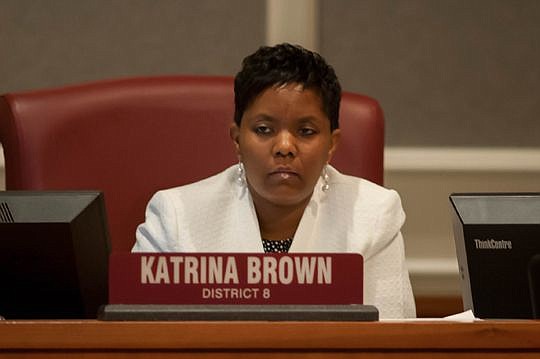
The Rev. R.L Gundy of Mount Sinai Missionary Baptist Church stood before City Council this month, a list of demands in his hand, a row of fellow African-American men at his back.
They were there to make a statement about the state of affairs involving the black community and police.
“You’ve got to do something about it,” he told council members before taking a step back, locking arms with his cadre in silence for his remaining two minutes of public comment.
Atop Gundy’s list was a common request: The creation of a civilian review board, a way for independent oversight into police-involved disputes.
Most frequently the calls come after police-involved shootings like that in the death of Vernell Bing Jr., a 22-year-old unarmed black man shot in Springfield after ramming a car into a police cruiser following a high-speed case.
Gundy told council he’d talked to Mayor Lenny Curry and Sheriff Mike Williams about a citizen-review board, but Williams “doesn’t want independent investigations.”
Council member Katrina Brown responded by saying she’d done research on the issue since taking office July 1. And after “thousands” of calls and emails early on, she committed to Gundy and others she would submit legislation to pursue a citizen-review board.
“It’s going to be controversial,” she said, “I’m going to be attacked left and right … but I got elected to serve the people.”
She isn’t quite sure what such a board would look like in the bill.
Brown said she hasn’t had conversations with Williams or the State Attorney’s Office about it. But she affirmed her commitment to filing a bill, saying it would further allow public discourse.
“I think the conversation needs to take place,” she said. “When you have a community crying out for change, you at least allow those opportunities for things to be talked about.”
Through a spokeswoman, Williams declined comment until he sees any legislation.
Brown said the issue is something she’s wanted to address while in office, but the budget and talks to expand the human rights ordinance and extend a half-cent sales tax to pay down pension debt all took priority.
She also realizes that while Gundy and others are in favor of adding the boards, not everyone agrees.
Opponents, she said, sometimes believe when citizens review situations “they are always going to disagree with what JSO (Jacksonville Sheriff’s Office) says.”
Steve Zona, president of the local Fraternal Order of Police lodge, said transparency is “critical” to ensuring trust, but he remains unconvinced civilian review boards offer objectivity.
Once officer-involved situations are resolved — cases are reviewed internally — details of the investigation are made public.
A civilian-led board, said Zona in a statement, “holds no standing beyond an additional opinion” and can be manipulated for political purposes or speed up the process.
Intervention of an agency’s ability to conduct its own review would “significantly damage the integrity of the process,” he said.
When past concerns have arisen, he said, outside help is sought — he used the example of Williams asking the FBI to review the office’s investigation of the Bing shooting.
Additionally, the union would encourage its members not to participate in the boards, said Zona.
The council research division provided Brown with several examples of other cities that have some form of outside review.
A few examples and some of their duties are:
• Denver, which has a seven-member citizen oversight board appointed by the mayor. The board makes policy recommendations about discipline, use of force, hiring and training and other areas.
• Seattle, which has a professional accountability review board of seven members appointed by city council. It reviews complaints by an office of professional accountability and assesses fairness, timeliness and thoroughness of that office’s process. Among its many duties, the board also advises the city on police department policies related to accountability and conduct.
• Portland, which has an 11-member citizen review committee appointed by city council. It recommends policy changes to the chief of police, director of independent police review and council. The board also has hearings to consider appeals by complainants or police officers.
In all, eight boards were reviewed as part of the research.
Brown said she doesn’t know what the makeup of a Jacksonville board would look like or even what duties it would have.
She’s still deciding whether to schedule a public meeting before introducing any bill, but also might offer sample legislation to start the conversation.
@writerchapman
(904) 356-2466